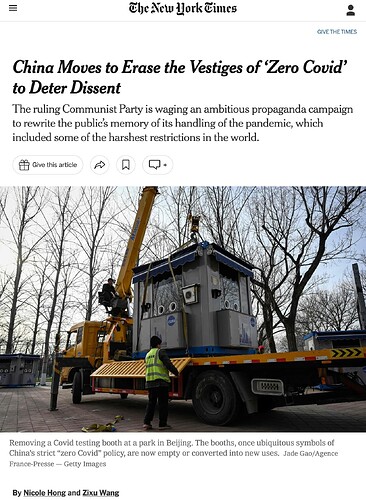-
中国共产党正在发动一场雄心勃勃的宣传运动,以改写公众对 "动态清零 "的记忆,这是中国领导人习近平的一项政策,它有助于遏制病毒,但也窒息了经济。该信息旨在增强习近平先生的权威,阻止异议,并在国内捍卫中国的政策。
-
这场运动的叙述忽略了 "动态清零"的极端做法,如殴打离家出走的居民或将他们的孩子与他们分开。它也忽略了政策突然取消后出现的混乱,这使得医院和火葬场对新的感染和死亡的爆炸毫无准备。
-
这一运动是在与美国就中国对这一流行病的处理日益紧张的情况下进行的,包括中国对病毒来源调查的保密性。美国能源部最近得出结论,“信心不足”,新冠病毒可能来自中国的一个意外实验室泄漏,中国政府对此予以否认。
-
中国长期以来一直使用审查和宣传来控制公众舆论,往往是为了挑战共产党的合法性。最近,参加全国范围内反对 "动态清零 "抗议活动的几个人被逮捕和拘留,这是自1989年天安门广场以来对该国威权领导的最大挑战。
-
由于政府对这一流行病的处理,许多中国公民感到鞭长莫及、悲痛和沮丧。看到政府对大流行病的宣传,使许多公民进一步感到痛苦,他们选择避免阅读。
-
共产党打赌,随着时间的推移,人们会忘记抗议和引发抗议的问题,但公众对大流行病的反应可能太大,不能被忽视。尽管有审查和宣传,公民仍然能够表达他们的不满,使党更难控制叙述。
-
中国政府试图通过淡化新冠疫情的死亡人数,将其一党政治控制的模式描绘成优于民主。
-
官方公布的8.3万死亡人数被研究人员和中国社交媒体评论员认为是严重不足的数字。
-
政府利用迫在眉睫的病毒威胁来激励国家和动员公民,宣布对病毒进行 “人民战争”,并警告说隐瞒感染情况的地方官员将受到惩罚。
-
中国共产党已经宣布他们的大流行病政策是 “完全正确的”,并发起了一场 "适当的运动 "来强调这一信息。克莱蒙特-麦肯纳学院(Claremont McKenna College)的教授Minxin Pei说,这是他们叙述中的一个 “戏剧性变化”。国家电视网络的社交媒体帖子已经审查了数千条评论,只显示那些赞扬政府的评论。
-
试图重现 "动态清零"时代的记忆在网上被审查,"我们要的是食物,不是新冠测试 "这样的口号被从中国互联网上抹去。国家媒体对长期进行新冠检测发出警告,但是有些媒体的语气更加轻松。
-
他们借用了社交媒体上流行的一句话,将任何尚未检测出阳性的人称为 “决赛选手”,基本上是将逃离病毒比作一场电子游戏。这显示了中国政府如何试图控制讨论,并以积极的方式进行叙述。
-
2023年1月,中国的一个电视农历新年综艺节目几乎没有提到这种大流行病,只有一曲《马上就会好的》的表演,其中有一句歌词是 “不再使用口罩”。政府正试图恢复公众对党的领导的信心,并通过鼓励中国消费者重新开始花钱来振兴经济。
-
许多中国人正在展望未来,渴望将大流行病抛在脑后,重新与世界联系。然而,政府试图压制那些挑战官方说法的人,包括惩罚警告病毒的医生李文亮和逮捕公民记者张展。
-
尽管人们希望从大流行病中走出来,但许多人仍然意识到过去三年的痛苦和荒谬,并决心记住它,反对社会遗忘。
-
The Chinese Communist Party is waging an ambitious propaganda campaign to rewrite the public’s memory of “zero Covid”, a policy of China’s leader, Xi Jinping, which helped contain the virus but also smothered the economy. The message aims to bolster Mr. Xi’s authority and deter dissent, as well as defend China’s policies domestically.
-
The narrative of the campaign ignores the extremes of “zero Covid”, such as beating residents for leaving their homes or separating their children from them. It also ignores the chaos that ensued after the policy’s abrupt dismantling, which left hospitals and crematories unprepared for the explosion in new infections and deaths.
-
The campaign comes at a time of heightening tensions with the U.S. over China’s handling of the pandemic, including the secrecy it has shrouded over investigations into the virus’s origins. The U.S. Energy Department recently concluded with “low confidence” that the Covid-19 virus likely originated from an accidental lab leak in China, which Beijing has denied.
-
China has a long history of using censorship and propaganda to control public opinion, often in order to challenge the legitimacy of the Communist Party. Recently, several individuals who participated in the nationwide protests against “zero Covid” have been arrested and detained, the biggest challenge to the country’s authoritarian leadership since Tiananmen Square in 1989.
-
Many Chinese citizens are feeling a sense of whiplash, grief, and frustration due to the government’s handling of the pandemic. Seeing the government propaganda about the pandemic causes further distress for many citizens, who choose to avoid reading it.
-
The Communist Party is betting that over time, people will forget about the protests and the issues that sparked them, but the public’s reaction to the pandemic may be too great to be ignored. Despite censorship and propaganda, citizens are still able to express their dissatisfaction, making it more difficult for the Party to control the narrative.
-
China’s government is attempting to portray its model of one-party political control as superior to democracy by downplaying the Covid-19 death toll.
-
The official death toll of 83,000 is regarded as a severe undercount by researchers and Chinese social media commenters.
-
The government has used the looming threat of the virus to motivate the country and mobilize citizens, declaring a “people’s war” against the virus and warning that local officials who hid infections would be punished.
-
China’s Communist Party has declared that their pandemic policies were “completely correct”, and have launched a “proper campaign” to accentuate this message. Minxin Pei, a professor at Claremont McKenna College, said this was a “dramatic change” in their narrative. Social media posts by state television networks have censored thousands of comments, displaying only those that praise the government.
-
Attempts to resurface memories from the “zero Covid” era have been censored online, and slogans like “we want food, not Covid tests” have been scrubbed from the Chinese internet. State media outlets warned about the lingering effects of long Covid, but some struck a more lighthearted tone.
-
They borrowed a phrase trending on social media that labeled anyone who had not yet tested positive as a “final round player”, essentially comparing escaping the virus to a video game. This shows how the Chinese government is trying to control the discussion and spin the narrative in a positive light.
-
In January 2023, a televised Lunar New Year variety show in China made almost no mention of the pandemic, with the exception of a performance of the song “It Will Be Better Soon” which included a lyric of “No more using masks”. The government is attempting to restore public confidence in the party’s leadership and revive the economy by encouraging Chinese consumers to start spending money again.
-
Many Chinese people are looking to the future, eager to put the pandemic behind them and reconnect with the world. However, the government has sought to silence those who challenged the official narrative, including punishing doctor Li Wenliang for warning about the virus and arresting citizen journalist Zhang Zhan.
-
Despite the desire to move on from the pandemic, many people are still aware of the suffering and absurdities of the past three years and are determined to remember it and fight against society forgetting.
链接:China Moves to Erase the Vestiges of ‘Zero Covid’ to Deter Dissent - The New York Times
